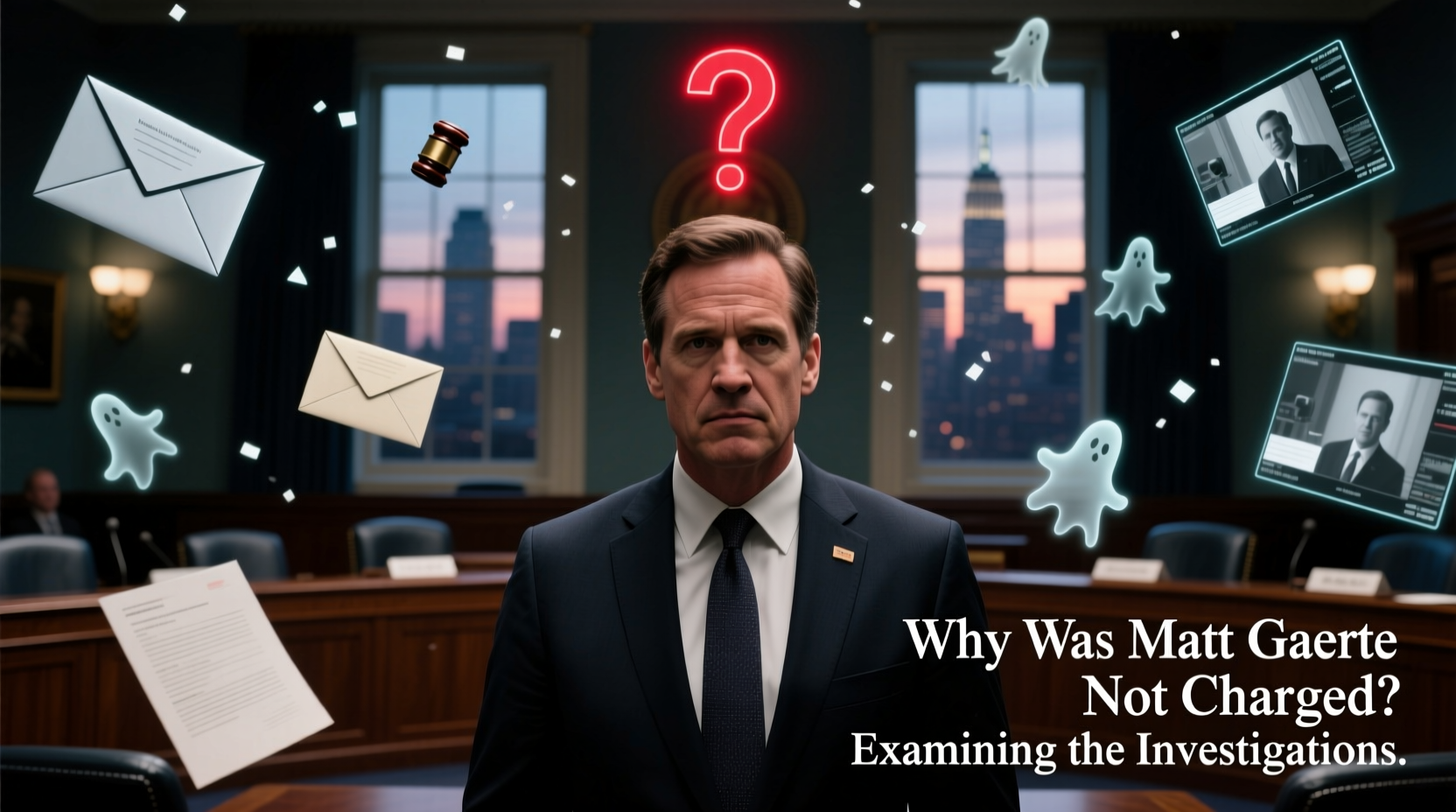In early 2023, after a two-year federal investigation, the Department of Justice (DOJ) announced it would not pursue criminal charges against Congressman Matt Gaetz, despite allegations involving sex trafficking, illicit drug use, and witness tampering. The decision sparked widespread public debate, media scrutiny, and questions about prosecutorial standards, political influence, and evidentiary thresholds in high-profile cases. This article examines the multiple layers of the investigation, the reasons behind the non-prosecution decision, and the broader implications for accountability in American politics.
The Origins of the Investigation

The DOJ launched its inquiry into Representative Matt Gaetz in 2021 following reports from media outlets, including the New York Times, alleging that he had engaged in inappropriate relationships with underage girls and participated in illegal activities involving drugs and payments for sex. The investigation centered on whether Gaetz violated federal sex trafficking laws by engaging in sexual conduct with a minor—specifically, a 17-year-old girl—and whether he obstructed justice by attempting to influence witnesses.
Federal authorities examined financial records, travel logs, text messages, and conducted interviews with over 50 individuals, including friends, associates, and alleged participants in the events under scrutiny. The case was assigned to the U.S. Attorney’s Office for the Southern District of New York, known for handling complex public corruption and sex crimes cases.
Key Legal and Evidentiary Challenges
Despite the seriousness of the allegations, prosecutors faced significant legal and procedural obstacles that ultimately contributed to the decision not to charge Gaetz.
- Age of the Alleged Victim: While the central figure was 17 at the time of the alleged encounters, she turned 18 shortly thereafter. Federal sex trafficking statutes require proof that a person was induced to engage in commercial sex acts while under 18. Prosecutors reportedly struggled to establish that money or gifts were exchanged explicitly for sex during the period when she was still a minor.
- Lack of Direct Evidence: No physical evidence, such as photos or recordings, conclusively linked Gaetz to illegal sexual activity. Text messages and testimonies were often ambiguous or open to interpretation, making it difficult to meet the “beyond a reasonable doubt” standard required for conviction.
- Witness Credibility Issues: Some key witnesses, including individuals close to the alleged victim, provided inconsistent statements or were deemed unreliable due to their own potential criminal exposure or personal motives.
- Jurisdictional Complexity: Much of the alleged conduct occurred across state lines (Florida to California), requiring coordination between multiple agencies and complicating the chain of evidence.
“Prosecutors don’t decide based on suspicion—they need admissible, credible evidence that can hold up in court. In politically sensitive cases, the bar is even higher.” — Sarah Chen, Former Assistant U.S. Attorney
Timeline of Key Events
The investigation unfolded over more than two years, marked by shifting developments and internal DOJ deliberations.
- April 2021: DOJ opens investigation after media reports detail allegations against Gaetz.
- October 2021: FBI raids properties linked to Joel Greenberg, Gaetz’s former associate and then-Volusia County Tax Collector, who later pleads guilty to sex trafficking and other charges.
- January 2022: Greenberg cooperates with prosecutors and names Gaetz as a participant in illicit activities, including paying for sex with minors.
- Summer 2022: Internal DOJ divisions debate whether evidence supports an indictment; disagreements arise between career prosecutors and leadership.
- February 2023: Senior officials conclude there is insufficient evidence to secure a conviction and decline prosecution.
- March 2023: Report surfaces that Attorney General Merrick Garland personally reviewed the case before finalizing the decision.
Political and Institutional Implications
The decision not to charge Gaetz raised concerns about equity in the justice system, particularly given his status as a sitting member of Congress. Critics questioned whether political pressure influenced the outcome, especially since Gaetz is a vocal critic of the Biden administration and has close ties to conservative media.
However, DOJ protocols emphasize independence from political interference. Career prosecutors typically make charging decisions based on evidence, not public opinion or political affiliation. Still, the perception of unequal treatment persists, particularly when contrasted with how other public figures have been pursued on lesser evidence.
Additionally, the case highlighted the limitations of congressional ethics enforcement. While the House Ethics Committee opened its own review, such bodies lack criminal authority and often move slowly. Without external oversight mechanisms, lawmakers may operate in a gray zone where allegations are investigated but rarely result in formal sanctions.
| Factor | Impact on Prosecution Decision |
|---|---|
| Evidence of payment for sex with minor | Insufficient direct proof; circumstantial only |
| Witness cooperation | Mixed reliability; some recanted or withheld info |
| Legal threshold (beyond reasonable doubt) | Not met due to gaps in timeline and intent |
| Political profile of defendant | No official impact, but public scrutiny increased pressure |
| Co-defendant cooperation (Greenberg) | Provided claims but lacked corroborating documentation |
Expert Insight: Why Investigations Don’t Always Lead to Charges
It’s critical to understand that not every serious allegation results in prosecution—not because wrongdoing didn’t occur, but because the legal system demands rigorous proof. As legal scholar Daniel Reilly explains:
“The difference between a credible allegation and a provable crime is often vast. Investigators may believe something happened, but unless they can prove it in court, charging would risk undermining public trust in the justice system.” — Daniel Reilly, Constitutional Law Professor, Georgetown University
This principle applies equally to powerful figures and private citizens. The Gaetz case underscores how the burden of proof operates as both a safeguard and a limitation.
FAQ
Did Matt Gaetz admit to any wrongdoing?
No. Gaetz has consistently denied all allegations, calling them a \"smear campaign\" orchestrated by political enemies. He has not entered any plea deal or admitted fault in connection with the investigation.
Could new evidence lead to future charges?
Theoretically, yes. If new, credible evidence emerges—such as previously undisclosed communications or testimony from a reliable source—the DOJ could reopen the case. However, given the thoroughness of the original probe, this is considered unlikely.
What role did Joel Greenberg play in the investigation?
Greenberg, a former Florida official, pleaded guilty to multiple federal crimes, including sex trafficking of a minor. He reportedly told investigators that he arranged encounters between Gaetz and women, including minors, and discussed splitting proceeds from video content. His testimony was central but ultimately deemed insufficient without corroboration.
Conclusion: Accountability Beyond the Courtroom
The decision not to charge Matt Gaetz does not equate to exoneration. It reflects the high evidentiary standards of the criminal justice system, not a verdict on character or conduct. For voters, journalists, and watchdog organizations, the case serves as a reminder that accountability extends beyond indictments.
Citizens can demand transparency through continued media scrutiny, ethical reviews, and informed voting. Institutions must also consider strengthening mechanisms for investigating misconduct by elected officials, ensuring that no one is above scrutiny—whether or not a prosecutor files charges.









 浙公网安备
33010002000092号
浙公网安备
33010002000092号 浙B2-20120091-4
浙B2-20120091-4
Comments
No comments yet. Why don't you start the discussion?